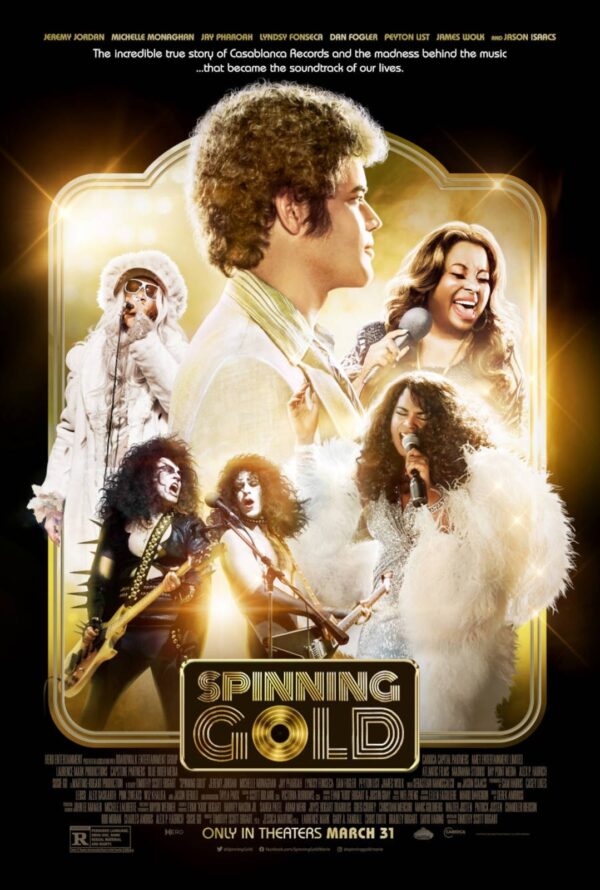Spinning Gold, 2023.
Directed by Timothy Scott Bogart and Quinn Scott Bogart.
Starring Jeremy Jordan, Michelle Monaghan, Winslow Fegley, Lyndsy Fonseca, Sebastian Maniscalco, Taylor Parks, James Wolk, Jason Derulo, Doron Bell, Wiz Khalifa, Casey Likes, Michael Ian Black, Jay Pharoah, Caylee Cowan, Dan Fogler, Peyton List, Vincent Pastore, Chris Redd, Ledisi, Jason Isaacs, Ellen David, Alex Gaskarth, George Nickolas K., Sam Nelson Harris, Dusan Dukic, Obi Abili, David Reale, Nick Sandow, Christopher Hayes, Johnny Gill, Pink Sweat$, Charlie Ebbs, Delia Lisette Chambers, Marcel Nahapetian, Seaton Smith, Cait Alexander, John Skelley, Emily Rose David, and Alex Gravenstein.
SYNOPSIS:
A biopic of 1970s record producer Neil Bogart, co-founder of Casablanca Records.
The fact that Timothy Scott and Quinn Scott Bogart direct Spinning Gold, the children of the film’s subject, Neil Bogart, tells one everything they need to know about this vanity project. Centered on Neil’s (played here by Jeremy Jordan as if he is in a gangster movie, which I suppose is an intentional choice albeit one that feels out of place) independent label Casablanca Records, there is a bombardment of heavy narration boldly assuming that viewers have been anticipating this story of near-financial bankruptcy to smashing success to get the movie treatment with the same fervor as biopics about legendary musicians themselves.
That’s not a knock on someone who knows about this history and cares about this story, but realistically speaking, it’s for a small audience that doesn’t expand much beyond this family. If there were a compelling narrative to tell, that wouldn’t be an issue, but nothing separates Spinning Gold from generic biopics taking a look at actual celebrities that the public does want to know more about. Even worse, the film’s tone is utterly baffling (courtesy of a script from Timothy Scott Bogart), sometimes wanting to depict a lifestyle of excess but inauthentically so.
The offspring filmmakers have sanitized much of the details, presumably to preserve a more positive image of their father (which becomes more flabbergasting considering how the film handles his affair with another woman that more matches his single-minded ambition). The result is something R-rated in language that plays like a parody of the genre. It’s not just the type of biopic Walk Hard targeted, but a movie with scenes so insultingly phony that they would fit right into that movie’s skewering of biopics.
Since it’s unlikely that viewers, casual or not, have an encyclopedic knowledge of what acts Casablanca Records signed, their most well-known performers include Kiss, Donna Summer, Gladys Knight, Bill Withers, and Ronald Isley, all rounded out by actors portraying them with various degrees of success. Taylor Parks shines the most as Donna Summer, searching for her voice and undergoing a transformation in persona while breaking out, and then there are actors playing Kiss band members less like real people and more like soap opera sitcom characters. I am not an expert on any of these artists, but this film’s depiction of Kiss crosses the line into fantasyland absurdity, all because the movie only exists to function as a shrine to Neil Bogart.
The other obvious issue here is that, in doing this, Spinning Gold often feels like it’s trying to cram seven other biopics into this overarching biopic. And while I’m not necessarily concerned with facts during movies like this, when a movie tries to convince you “everything is real except for the parts that aren’t,” you can’t help wondering and questioning what you are watching, especially since there isn’t much here that feels true.
Then there is the structure of Spinning Gold, which is strange and obliterates whatever momentum the first 20 or 30 minutes build. For a brief moment, there is intrigue in how Neil Bogart will escape his debts and turn the ship around, with the narration seemingly admitting that no one cares about what came before. Maddeningly, the story jumps back in time for roughly an hour to give Neil’s life story, including his complicated relationship with his father (Jason Isaacs), a look at previous business ventures, and insight into his friendships and love life (Michelle Monaghan followed by Lyndsy Fonseca). None of these dynamics contain much depth, although there are some solid performances (at least when the film tries to elicit a sense of realism rather than cloying sentimentality).
In a confounding turn of events, the finale of Spinning Gold seems to reverse its stance from the opening narration about how everyone knows who Neil Bogart is and wants to hear this story. There’s no arc or anything indicating that the filmmakers have come around to this; it’s just a random shift. There’s the occasional decent scene where Jeremy Jordan entertains with high-wire determination elevated by competent period details, and this is a mildly intriguing piece of music history, but that’s where the compliments end.
Spinning Gold never transcends the idea that a pair of siblings made this movie to honor the father; there is no purpose to it or anything worthwhile to shout out loud. This record is the same as the standard biopic but has a far less interesting subject; it won’t be spinning for long.
Flickering Myth Rating – Film: ★ ★ / Movie: ★ ★
Robert Kojder is a member of the Chicago Film Critics Association and the Critics Choice Association. He is also the Flickering Myth Reviews Editor. Check here for new reviews, follow my Twitter or Letterboxd, or email me at MetalGearSolid719@gmail.com
















